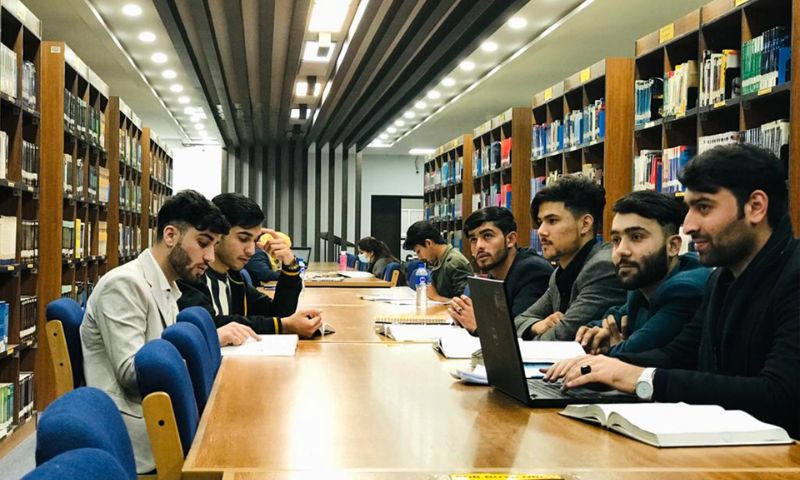
by Abdul Mussawer Safi 30 November 2023
Every child, regardless of color, creed, or place of birth, has the fundamental right to an education. Nonetheless, many Afghan migrant students in Pakistan face several challenges and problems in acquiring a high-quality education. In response to this issue, the Board of Intermediate and Secondary Education Mardan (BISEM) has instituted a generous decision that exempts Afghan migrant students from paying any board fees. This comprises the costs of examination, admission, registration, and migration. As a result, kids can attend college without worrying about how they will pay for it. With this deed, BISEM hopes to inspire future leaders and students to collaborate in harmony and peace between neighboring countries.
Students may strengthen their resistance to violent extremism through education. It creates a more profound commitment to peace and nonviolence among people by opposing discriminatory and aggressive attitudes. Unfortunately, fanaticism and extremism are threatening cultural variety and human rights in many cultures; education alone will not stop their spread. A society that values variety and tolerance must also value freedom, democracy, justice, gender equality, and social inclusion.
The worldwide literacy rate is 86.3%, with significant diversity among countries and regions (UNESCO). Afghanistan, Pakistan, Chad, and Niger are nations with low literacy rates, putting them at the forefront of fundamentalism and extremism. Afghanistan has a depressingly low literacy rate of 43%, with men having a literacy rate of 55.5% and females having a rate of 29.8%. In Pakistan, women have a lower literacy rate (46.49%) than men (69.29%). Literacy is prevalent among 58% of the population. Individuals’ ability to gain information, voice their ideas, and participate in policymaking needs to improve due to their inability to read.
According to the Special Rapporteur on Cultural Rights, fundamentalism and extremism disproportionately impede women’s cultural rights. According to the author, to successfully oppose extremism and fundamentalism, a human rights-based policy must be all-encompassing, prioritize cultural rights and gender equality, and be fully aware of gender dynamics. She has also stressed the crucial importance of education in averting violent extremism, arguing that the arts, sciences, and culture are essential for shielding young people from radicalization, encouraging inclusion, producing alternatives, and allowing peaceful discourse.
Since its creation, Pakistan has generously accepted millions of Afghan refugees displaced by war, poverty, and other humanitarian disasters. Pakistan has not only offered them shelter, food, and medical treatment but has also given them access to educational possibilities that will help them and their country rebuild. This effort illustrates that Pakistan has maintained its stand on young Afghan empowerment.
The BISEM has decided to exclude Afghan migrant students from paying all board fees, including those for admission, registration, and exams. This humanitarian project shows Pakistan and Afghanistan’s lasting and deep connections, which transcend economic concerns.
According to the United Nations High Commissioner for Refugees (UNHCR), 54 refugee settlements in Pakistan provide educational opportunities to over 57,000 refugee children. The UNHCR’s Albert Einstein German Academic Refugee Initiative (DAFI) also offers higher education scholarships to young Afghan refugees of between 17 to 30 age young people.
During distress, Pakistan gives help and support to its fellow Afghan citizens via the BISEM fee waiver scheme. This also demonstrates Pakistan’s acknowledgment of education as a fundamental right for all children, regardless of country, religion, or ethnicity. Two neighboring nations, Pakistan and Afghanistan, may lay the groundwork for a future defined by collaboration, peace, and harmony by allocating financial resources to their children’s education.
Lastly, Pakistan’s unwavering commitment to improving educational opportunities for Afghan children illustrates its abiding compassion. Departing from the political debate over deporting undocumented immigrants would undermine decades of generosity and help for Afghan refugees. This is an excellent first step in strengthening connections between Afghanistan and Pakistan, founded on collaboration, mutual respect, and a dedication to the well-being and growth of their respective communities. Both countries must continue to build on these foundations to forge deeper relationships that transcend geopolitical boundaries and improve the region’s general well-being and stability. Maintaining diplomatic efforts under the common principles of compassion and commitment might help to achieve a peaceful future by adopting a cooperative mentality.
